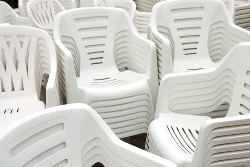 |
| (photo credit: Zzvet for Shutterstock) |
Wow.
Meant To See
Would I have noticed that a year ago, or one year on? I was glad I got to see that. I believe I was meant to see that.But of course, there must be balance, which means that the distillation of events is not always a happy occurrence. For instance my son’s hanachat tefillin on Thursday last, the first time he put on phylacteries at the Western Wall. Looking for a free chair on which to place my handbag and other paraphernalia, I came to a stack of plastic chairs topped with a bag. I asked the woman sitting next to them if I might take one. She snapped out a harsh, “NO,” to my polite request.
 |
| (photo credit: gh19 for Shutterstock) |
Ouch.
I tried to reason with her, “I have a bar mitzvah,” I explained.
Weddings Trump Bar Mitzvahs
“I have a wedding!” said she, as if to say weddings trump bar mitzvahs.
“And clearly you’re using all of those chairs right now,” I said with as much composure as I could gather, chastising her, though I should have said nothing at all.
 |
| (photo credit: Shutterstock) |
“No!” she snapped.
Whoa. What was it with this place?
She Found Them
At last I spotted an unclaimed chair and put my stuff down. At that moment, my daughter showed up. I told her I couldn’t really see where our men were on the other side of the mechitza and I’d pretty much given up. She went to scout things out and found them.
“Over here,” she said, beckoning.
Oy. Right next to that first woman who wouldn’t let me have a chair—the one with the wedding. By now there were a few other women with her, and I asked one of them if she could just inch forward a bit. The first woman began screeching at me.
I Was Trembling
By now I was trembling. I showed her that my family was directly on the other side of the mechitza, the barrier that separates men from women. I said, “This is my eighth of eight sons and it’s his bar mitzvah and it’s happening right here.”
I said this with as much fortitude as I could. I’m not really one to argue with strangers, especially not in
 |
| Through the mechitza. (photo credit: Varda Meyers Epstein) |
She started again telling me about so and so getting called to the Torah for his wedding. I pointed to the opening in the barrier. “Look,” I showed her. “My son and my family are RIGHT HERE.”
She stopped arguing then. How could she continue to argue with me? Clearly I had a right to be in that spot at that moment. But she stared at me disapprovingly the entire time. I could imagine what she was thinking, “Those orthodox people think they own the place,” or something like that. Perhaps she was thinking disdainful things about my appearance. That’s what I was imagining, anyway.
Don’t Do Well
I don’t do well with stuff like that. I was shaking. I really had to struggle to stay composed.
It’s not like this group of women was even praying. They sat around gossiping loudly. They were foreigners and cared little for the decorum of this holy place.
 |
| (photo credit: Natan Epstein) |
When it came time to throw candies at Asher, my daughter Liba offered the bag of candy to the group of women next to us, the ones with the wedding and overprotective keeper of chairs and they happily accepted. I was proud of Liba. I never would have done that in her stead. She was right to do that.
Baseless Hatred
It was two days before Yom Kippur, a time when God-fearing people are on their best behavior. The
 |
| View from between the mechitza slats (photo credit: Varda Meyers Epstein) |
There was no reason for this woman to snap at me as she had, and that was what upset me so. Both she and the other woman who said, “No!” when asked for a chair could have handled things differently. Both of them could have said, “I’m sorry, but I’m expecting a large group and I’m saving these chairs for them.”
They could have made an effort to point out chairs I might take from a different location, been helpful and kind.
 |
| (photo credit: Natan Epstein) |
I don’t much like the obvious answer.
But like I said, there’s always a balance. This time, balance came in the form of an email I received Erev Yom Kippur. I was in between chicken soup-making tasks and found this message in my inbox from my manager at Kars for Kids, “Working together day in day out, it’s almost impossible not to inadvertently say something hurtful, or fail to treat someone with the respect they deserve.
As such I’m proposing, according to the Yeshiva custom that everyone say out loud that they forgive everyone B’lev Shalem (wholeheartedly).”
A Clean Slate
I was overcome. What a beautiful suggestion. It made it so easy, so possible, for all to start the year with a clean slate.
I did as my manager had suggested and said the phrase aloud, thinking of all my co-workers.
Then I thought of that woman at the Wall, the keeper of the chairs. Without hesitating I said with as much feeling as I could muster, “I forgive you b’lev shalem.”
 |
| (photo credit: Natan Epstein) |